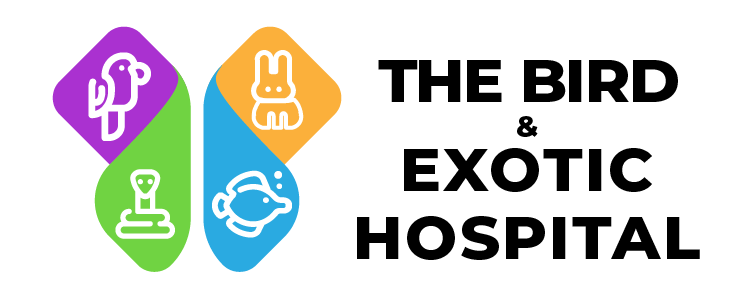The Importance of Oral and Dental Health for Exotic Pets
The Importance of Oral and Dental Health for Exotic Pets

When we think about pet dental care, cats and dogs often get all the attention—but what about exotic pets? Whether you have a rabbit, parrot, bearded dragon, or even a fish, oral health plays a crucial role in their overall health. Many exotic animals have unique dental structures and care needs, making regular monitoring and proper maintenance essential.
At The Bird and Exotic Hospital, we specialize in the care of small mammals, birds, reptiles, fish, and other exotic pets in the Greenacres, FL area. For Pet Dental Health Month, we wanted to explore why dental and oral health is so important for exotic species and the common issues they face.
Why Dental Health Matters for Exotic Pets
Many exotic animals rely on strong, healthy teeth or beaks for survival. From chewing fibrous foods to cracking seeds to grinding vegetation to capturing prey, oral health directly affects your exotic pet’s ability to eat, groom, and thrive. Dental diseases and oral health issues in exotic pets often go unnoticed until they become severe, leading to malnutrition, infections, or even life-threatening complications.
- Some small mammal species, like rabbits, have continuously growing teeth.
- Birds, turtles, and tortoises depend on beak health to properly eat and forage.
- Reptiles, including snakes and lizards, can suffer from mouth infections and tooth loss.
- Fish can develop oral infections, affecting their ability to feed.
Because exotic pets may naturally hide signs of pain, regular veterinary exams with an exotics veterinarian are necessary for the early detection of oral or dental problems.
Common Oral & Dental Issues in Exotic Pets
Overgrown Teeth (Small Mammals)
Many small mammals—like rabbits, guinea pigs, rats, and chinchillas—have teeth that grow continuously throughout their lives. Without proper wear, these teeth can become overgrown or misaligned, leading to:
- Difficulty eating or complete refusal to eat (malocclusion).
- Cuts and ulcers inside the mouth from sharp, overgrown teeth.
- Abscesses or infections caused by trapped food and bacteria.
Make sure your small mammal pet has access to vet-approved chew toys and species-appropriate diets to naturally wear down teeth.
Beak Overgrowth & Deformities (Birds, Turtles, and Tortoises)
A bird’s beak isn’t just for eating—it’s a tool for grooming, climbing, and interacting with their environment. However, improper diet, lack of wear, or health issues can cause overgrown, cracked, or misaligned beaks in avian pets, making it difficult for them to eat or preen.
- Certain avian species are prone to beak overgrowth from not chewing enough hard foods.
- Turtles or tortoises with improper diets may develop soft, misshapen beaks due to nutrient deficiencies.
Provide safe chewable objects and properly balanced diets to encourage natural beak maintenance.
Stomatitis aka Mouth Rot (Reptiles)
Many reptiles—including snakes, lizards, turtles, and tortoises—can develop mouth infections (stomatitis or “mouth rot”) due to poor husbandry, injuries, or stress. Symptoms of stomatitis may include:
- Swollen or red gums.
- Excessive drooling or trouble closing the mouth.
- Loss of appetite or weight loss.
Mouth infections in reptiles can become life-threatening at advanced stages. Maintain proper humidity, diet, and habitat conditions to reduce stress and keep your reptile’s mouth healthy.
Tooth Loss & Gum Disease (Fish)
While we don’t often think about fish having teeth, some species do have teeth that require maintenance. Poor water quality, improper diet, and bacterial infections can cause:
- Gum inflammation leading to difficulty eating.
- Tooth loss, making it hard for predatory fish to catch prey.
- Abscesses or mouth tumors, particularly in older fish.
Keep water conditions stable, provide species-appropriate diets, and monitor for signs of weight loss or difficulty feeding.
How to Keep Your Exotic Pet’s Teeth & Mouth Healthy
While dental care varies by species, a few general practices can help keep your exotic pet’s mouth healthy and in good condition. Feed your exotic pet a nutritionally rich diet and provide appropriate chewing materials. If you are unsure whether your pet’s current diet is meeting their needs, schedule a nutrition consultation with an exotics veterinarian. Always monitor your pet for signs of oral or dental issues, such as changes in eating habits, visible swelling, or a foul odor coming from the mouth.
Even if your exotic pet seems healthy, yearly veterinary visits are the best practice. Because exotic pets have unique dental structures, routine vet exams with an experienced professional are essential for teeth trims, beak trims, and detecting infections, ulcers, or early signs of disease. Many exotic pet dental issues can be avoided with early detection and proper care—don’t wait until your pet is in pain!
Prioritizing Exotic Pet Dental Health
The Bird and Exotic Hospital knows exotic pets can have unique oral and dental needs, but one thing remains the same: preventive care contributes to health and longevity. Regular check-ups, proper diets, and early detection of oral health problems can prevent pain, infections, and serious health complications.
Do you have an exotic pet in the Greenacres, FL area that is due for a dental check-up? Book an appointment with us today!
When we think about pet dental care, cats and dogs often get all the attention—but what about exotic pets? Whether you have a rabbit, parrot, bearded dragon, or even a fish, oral health plays a crucial role in their overall health. Many exotic animals have unique dental structures and care needs, making regular monitoring and proper maintenance essential.
At The Bird and Exotic Hospital, we specialize in the care of small mammals, birds, reptiles, fish, and other exotic pets in the Greenacres, FL area. For Pet Dental Health Month, we wanted to explore why dental and oral health is so important for exotic species and the common issues they face.
Why Dental Health Matters for Exotic Pets
Many exotic animals rely on strong, healthy teeth or beaks for survival. From chewing fibrous foods to cracking seeds to grinding vegetation to capturing prey, oral health directly affects your exotic pet’s ability to eat, groom, and thrive. Dental diseases and oral health issues in exotic pets often go unnoticed until they become severe, leading to malnutrition, infections, or even life-threatening complications.
- Some small mammal species, like rabbits, have continuously growing teeth.
- Birds, turtles, and tortoises depend on beak health to properly eat and forage.
- Reptiles, including snakes and lizards, can suffer from mouth infections and tooth loss.
- Fish can develop oral infections, affecting their ability to feed.
Because exotic pets may naturally hide signs of pain, regular veterinary exams with an exotics veterinarian are necessary for the early detection of oral or dental problems.
Common Oral & Dental Issues in Exotic Pets
Overgrown Teeth (Small Mammals)
Many small mammals—like rabbits, guinea pigs, rats, and chinchillas—have teeth that grow continuously throughout their lives. Without proper wear, these teeth can become overgrown or misaligned, leading to:
- Difficulty eating or complete refusal to eat (malocclusion).
- Cuts and ulcers inside the mouth from sharp, overgrown teeth.
- Abscesses or infections caused by trapped food and bacteria.
Make sure your small mammal pet has access to vet-approved chew toys and species-appropriate diets to naturally wear down teeth.
Beak Overgrowth & Deformities (Birds, Turtles, and Tortoises)
A bird’s beak isn’t just for eating—it’s a tool for grooming, climbing, and interacting with their environment. However, improper diet, lack of wear, or health issues can cause overgrown, cracked, or misaligned beaks in avian pets, making it difficult for them to eat or preen.
- Certain avian species are prone to beak overgrowth from not chewing enough hard foods.
- Turtles or tortoises with improper diets may develop soft, misshapen beaks due to nutrient deficiencies.
Provide safe chewable objects and properly balanced diets to encourage natural beak maintenance.
Stomatitis aka Mouth Rot (Reptiles)
Many reptiles—including snakes, lizards, turtles, and tortoises—can develop mouth infections (stomatitis or “mouth rot”) due to poor husbandry, injuries, or stress. Symptoms of stomatitis may include:
- Swollen or red gums.
- Excessive drooling or trouble closing the mouth.
- Loss of appetite or weight loss.
Mouth infections in reptiles can become life-threatening at advanced stages. Maintain proper humidity, diet, and habitat conditions to reduce stress and keep your reptile’s mouth healthy.
Tooth Loss & Gum Disease (Fish)
While we don’t often think about fish having teeth, some species do have teeth that require maintenance. Poor water quality, improper diet, and bacterial infections can cause:
- Gum inflammation leading to difficulty eating.
- Tooth loss, making it hard for predatory fish to catch prey.
- Abscesses or mouth tumors, particularly in older fish.
Keep water conditions stable, provide species-appropriate diets, and monitor for signs of weight loss or difficulty feeding.
How to Keep Your Exotic Pet’s Teeth & Mouth Healthy
While dental care varies by species, a few general practices can help keep your exotic pet’s mouth healthy and in good condition. Feed your exotic pet a nutritionally rich diet and provide appropriate chewing materials. If you are unsure whether your pet’s current diet is meeting their needs, schedule a nutrition consultation with an exotics veterinarian. Always monitor your pet for signs of oral or dental issues, such as changes in eating habits, visible swelling, or a foul odor coming from the mouth.
Even if your exotic pet seems healthy, yearly veterinary visits are the best practice. Because exotic pets have unique dental structures, routine vet exams with an experienced professional are essential for teeth trims, beak trims, and detecting infections, ulcers, or early signs of disease. Many exotic pet dental issues can be avoided with early detection and proper care—don’t wait until your pet is in pain!
Prioritizing Exotic Pet Dental Health
The Bird and Exotic Hospital knows exotic pets can have unique oral and dental needs, but one thing remains the same: preventive care contributes to health and longevity. Regular check-ups, proper diets, and early detection of oral health problems can prevent pain, infections, and serious health complications.
Do you have an exotic pet in the Greenacres, FL area that is due for a dental check-up? Book an appointment with us today!











